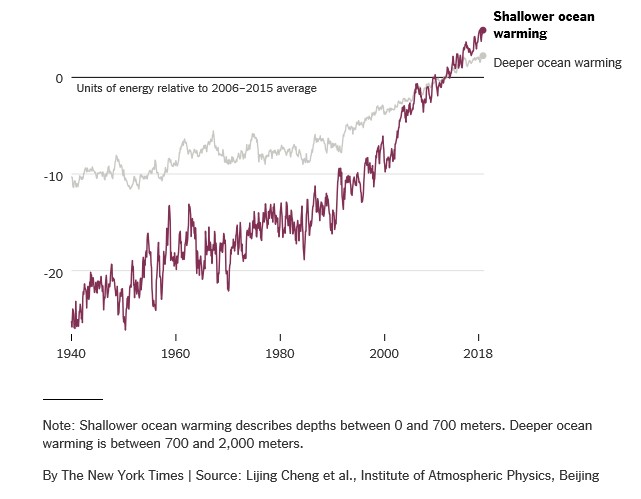Oceans are warming faster than previous thought due to fossil fuel burning according to data published in journal science

Oceans Are Warming Faster Than Previously Thought: New Evidence Revealed

In a groundbreaking study published in the prestigious journal “Science,” new data has emerged showing that our oceans are warming at a faster rate than previously believed. The study reveals the alarming impact of fossil fuel burning on our planet’s delicate ecosystem, with far-reaching consequences for both marine life and human civilization as a whole.
The research, led by experts in climatology and oceanography, presents a more comprehensive analysis of ocean temperatures by incorporating measurements that were previously overlooked. By combining data from multiple sources including scientific instruments, ships, and buoys, the researchers were able to obtain a more accurate picture of the ongoing changes in our oceans.

The study shows that the rate of ocean warming has been significantly underestimated in previous analyses. The oceans, acting as the Earth’s main heat sink, have absorbed over 90% of the excess heat generated by human activities since the 1970s. The new data suggests that the oceans have been warming at an average rate of 40% higher than what was previously estimated.
This rapid warming poses a grave threat to marine ecosystems, including coral reefs, which are highly sensitive to temperature changes. As ocean temperatures continue to rise, we can expect widespread bleaching events, leading to the death and destruction of these vital marine habitats. In addition, the changing temperatures disrupt the delicate balance of marine food chains, endangering numerous species that depend on them for survival.
But the consequences of increased ocean warming extend far beyond marine life. The warming waters have far-reaching implications for climate patterns, weather systems, and global sea levels. Rising temperatures contribute to the intensification of hurricanes, cyclones, and storms, putting coastal communities at an increased risk of devastating damage and loss of life.
The primary cause of this accelerated warming is the burning of fossil fuels, which releases large amounts of greenhouse gases into the atmosphere. These gases trap heat from the sun, causing a rise in global temperatures. As a result, the world’s oceans act as a vital buffer, absorbing excess heat and reducing the overall impact on land temperatures. However, the rapid increase in greenhouse gas emissions is overwhelming the oceans’ ability to cope, leading to the dangerous warming trend we are now witnessing.
It is crucial to take action to combat this escalating crisis. Transitioning to renewable energy sources, reducing carbon emissions, and implementing sustainable practices are all essential steps towards mitigating the effects of this excessive ocean warming. By minimizing our reliance on fossil fuels, we can slow down the rate at which our oceans are heating and protect the future of our planet.
Source: www.sciencedaily.com
Tags
Share
Related Posts
Quick Links
Legal Stuff

